Lien vers Pubmed [PMID] – 12800197
Int. J. Cancer 2003 Aug;106(2):216-23
High rates of loss of heterozygosity commonly affect multiple chromosomes in individual tumor types, yet the number of known tumor suppressor genes (TSGs) systematically mutated in the corresponding tumors is usually low. The search for homozygously deleted genome segments in tumor samples or cell lines has become a method of choice to identify major TSGs or to reveal their influence on the development of a given tumor type. Here, we report a detailed homozygous deletion (HD) profiling for 246 critical loci on a panel of 89 tumor cell lines containing significant subsets of lung, ovarian and head and neck squamous cell carcinomas. We found a total of 53 HDs affecting 17 loci. The major target for HDs was p16-INK4A/p14-ARF (23/89, 26% of cases). Among the remaining alterations, HDs affecting TP73 or telomeric markers have never been previously described, whereas other HDs represent the first examples associating lesions of certain TSGs with a given tumor type (NF2 in lung and ovarian cells, STK11 in HELA cells). Overall, tumor cell lines established from ovarian or lung carcinomas displayed a surprising diversity of loci targeted by HDs with 7 and 6 loci involved, respectively. Our data suggest that, beside allelotyping or transcriptome/proteome studies, extensive HD profiling represents a promising approach for the detection of hitherto not implicated signalling pathways of tumorigenesis.
